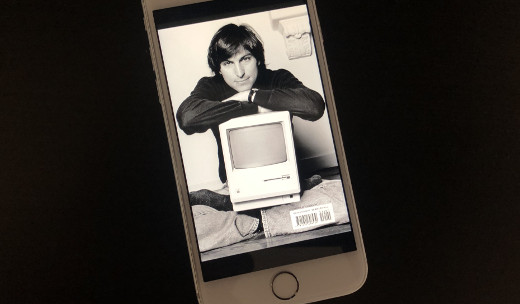My Takeaways From The Book Steve Jobs
When the authorized biography of Apple co-founder Steve Jobs came out shortly after he died in 2011, it was a book I was interested in reading. As someone who remembers the ascent of Apple as a kid and used both an Apple //e and early Macintosh in college, not to mention a recent convert to the iPhone, I was curious of what else I would have learned from this tech and marketing pioneer. That being said, with all else going on in my life and an existing unread tower of book at home, I didn’t buy it. However I always said, if the opportunity presented itself, I would read it.
That opportunity came a little over a year ago when I was visiting my aunt and needed to make a call for work, so I ducked into a room off the commons of her apartment complex to make the call. This room, which I never knew existed, was a literal library – books of all genres, movies on DVD and VHS (yes, VHS) as well as CDs. As I made my call I perused the shelves and low and behold, I saw the biography by Walter Isaacson, and started reading it on my trip home.
Though I finished reading the book Steve Jobs last year, I made notes of my takeaways from the over 600 pages of first-hand recollections from Jobs himself as well as from many people in his life. Where it’s been a while, these takeaways still ring true in my mind as well.
Do you need to have a personality like Jobs to be successful? This was my greatest takeaway from the book. My original notes said, do you need to be this “ruthless” and thinking about it more, I’m not sure if that is even the right word. Many influences in his life led to his personality of being highly focused, brutally honest, harsh… I could go on. In reading stories of successful people over the years, these types of traits tend to be a common theme. So I wonder, do you need to be wired a certain way to achieve a certain way, at least in business?
Marketing’s role in the rise of Apple – I had always heard that Steve Wozniak, Apple’s co-founder, was the technical brains behind the operation, with Jobs being the marketing and front-end pitchman for the firm. However I didn’t realize the extent of all he did, from early days of positioning empty boxes to the design of the cases, to create the aura of what Apple was and is. This level of detail and decision-making made Apple unique, as well as its products.
How much different would the story be if it was written now? As the book was released mere days following Jobs’ death, the interviews and stories of others in the book were given while he was still alive. As I read this, tucked in the back of my mind was how different – if any – would those stories have been if they were told to Isaacson after he died. Where we may not know completely, over time more may come from those interviewed.
Whether you’re an Apple fan or not, I recommend reading Steve Jobs, especially for people who are interested in the personal (and personalities) that are behind businesses. As I give away all of the books I read, this one went to a person who was more interested in the personalities and their interactions within the empires Jobs created.
This is from The Hot Iron, a journal on business and technology by Mike Maddaloni.
Did you enjoy this? Subscribe to The Hot Iron by RSS/XML feed or Read by Email.
Book Take-Aways • (2) Comments • Permalink




